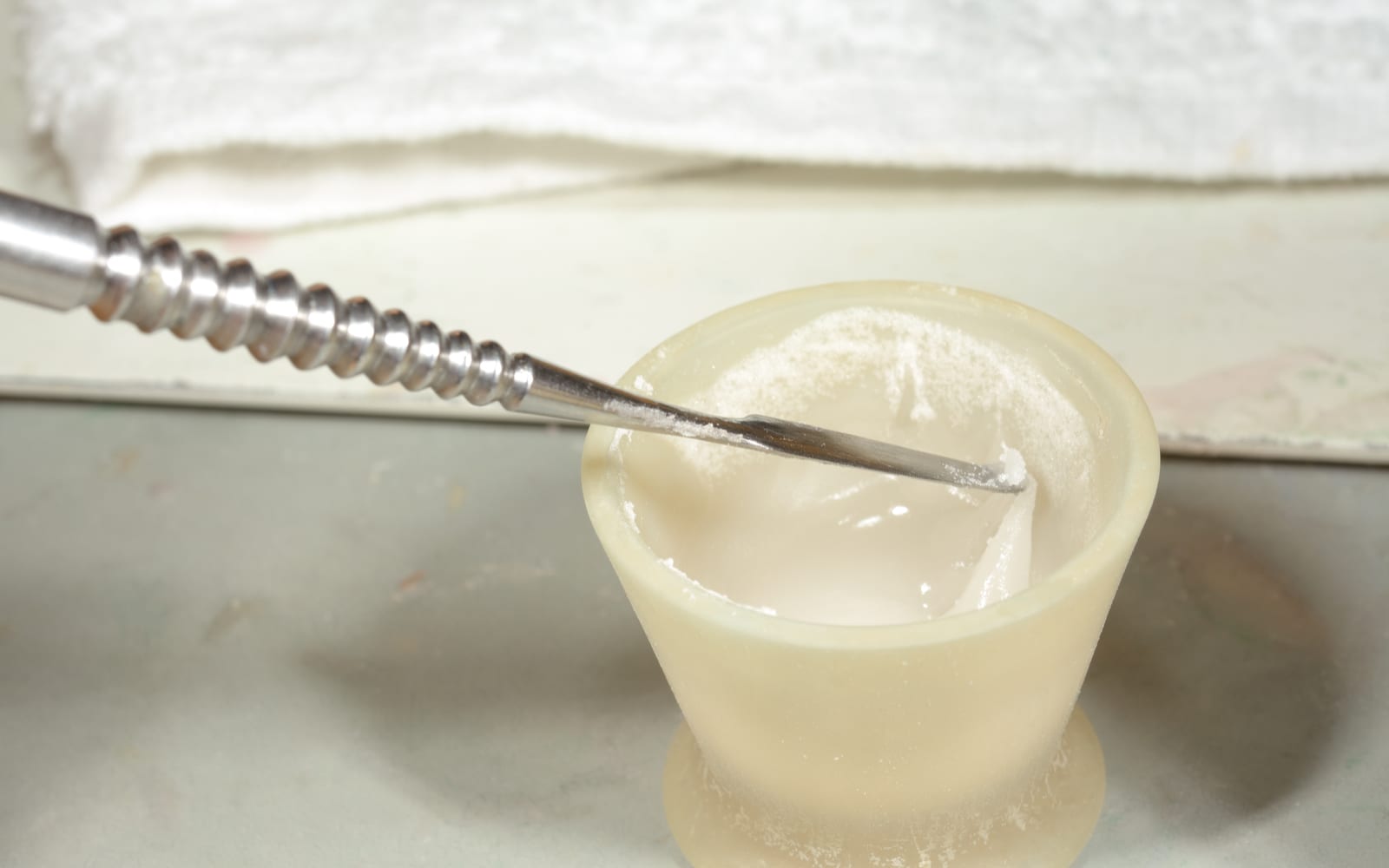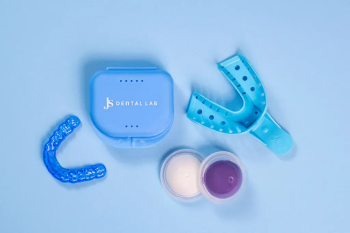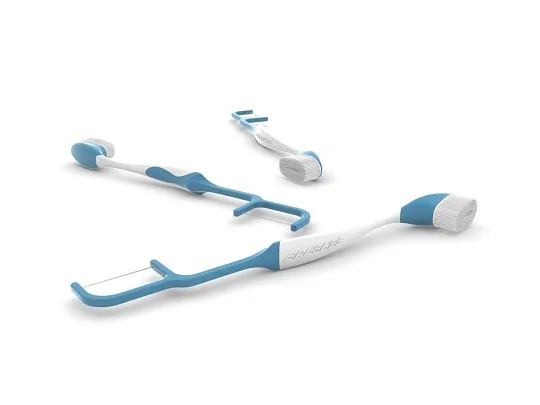The Right Brand Helps Control the Color, Porosity, and Conductivity of Your Materials
Because of their chemical properties, acrylic resins are the dental material of choice for denture bases and removable devices. Its polymer chain reaction creates bonds that reduce the chances of shrinkage, heat dispersion, and mold leakage. It has a high aesthetic quality, is cheaper than porcelain, and is also easier to process.
Its natural appearance and dimensional stability give the material a good resistance to bacteria growth and oral fluids. While its strength lacks luster compared to porcelain, acrylic is easier to repair, making it a viable choice for low-income patients. However, choosing the right acrylic for the job involves comparing your materials and understanding some of the chemical changes during polymerization because these factors determine the finished product and your patient’s satisfaction.
Acrylic resins have some major benefits and disadvantages over porcelain: while porcelain has more durability and strength, porcelain’s also more prone to scratching and breakage, unlike acrylic. Acrylic makes up the base of most dentures, and porcelain teeth cannot be bonded to an acrylic denture base. Acrylic doesn’t put as much pressure on the teeth and gums as porcelain, and for patients experiencing bone loss, acrylic helps to retain that support without digging into the sensitive parts of the mouth and jawbone. Although acrylic’s harder to clean due to its more porous indentations, it’s less prone to breakage when cleaning when compared to porcelain.
Acrylic has its benefits, but understanding which acrylic resin to use for the right procedure matters. There are multiple types of resins to choose from that contain acrylic components, including:
Heat-cure resin – Composed of powder and liquid, mixing these components together creates a chemical reaction through heat energy to create the rigid solid resin. Heat-cure resin is processed by creating a dough and then set and packed into a plaster to be squeezed, molded, and trimmed. These kinds of resins experience reduced polymerization shrinkage because of the granules of polymethyl methacrylate within the powder. Its polymerization method is highly exothermic because of the amount of heat produced and typically reaches a maximum temperature of 80 kJ/mol. Although highly volatile and flammable, the polymer powder is stable and has an indefinite shelf life.
Top 10 Resin-Based Dental Cements
Cold-cure resin – Cold-cure resins are identical to heat-cure in their chemistry, but the curing process is initiated by tertiary amine instead of heat. Although not as effective because of its lower molecular weight, it has higher strength properties. Its more prone to discoloration, and its viscosity during its doughy stage can affect the adaptation of the mixture when molding.
Pour-and-cure resin – Pour-and-cure resins aren’t as popular, but when mixed, their sufficient amount of liquid gives an excellent reproduction of surface detail. This surface detail, however, doesn’t compare to heat and cold cures.
Visible light cure resin – Visible light cures have high biocompatibility, low bacterial adherence, and ease of manipulation. The chemistry of these cures has more in common with composite restoratives, which makes differentiating between these two difficult. These resins are made with urethane dimethacrylate, containing a small amount of colloidal silica, and then contain a filler of acrylic beads that become part of the structure when cured. Certain brands such as Eclipse and Dentsply have improved the product’s impact strength and resistance to brittleness, and it’s widely used as a reline material for dentures and repairing fractured dentures.
Top 5 Composite Resin Filling Materials in Dentistry
1. Lucitone 199 by Dentsply Sirona
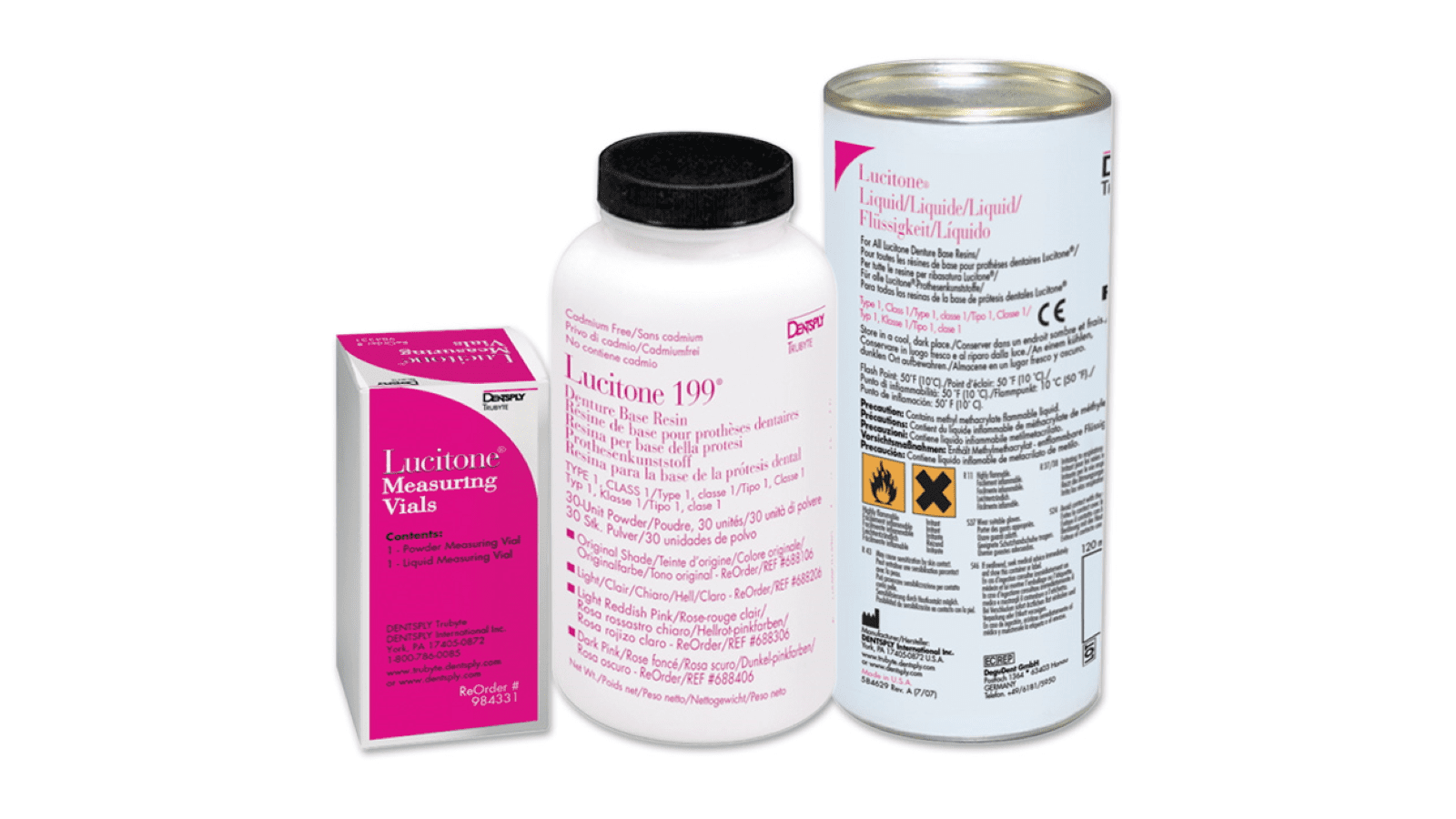
Product Description
Lucitone® 199 by Dentsply Sirona is a premium heat-cured denture base resin known for its exceptional aesthetics, high impact resistance, and superior flexural strength. Designed to simulate natural tissue, it delivers durable, lifelike dentures with long-term comfort.
Product Overview
Lucitone® 199 is cadmium-free for added patient safety and available in liquid or powder form for customized processing. Its balanced translucency and realistic gum and vein simulation have made it a benchmark in denture acrylics. Ideal for full or partial dentures, it offers reliable performance with enhanced wearability.
Key Features
- Heat-cured denture base resin
- High impact resistance and flexural strength
- Balanced translucency for natural appearance
- Simulates gums and veins for realistic aesthetics
- Cadmium-free for enhanced biocompatibility
- Available in liquid or powder forms
- Multiple shade options for customization
Common Applications
- Full and partial denture fabrication
- Customized denture base applications
- High-aesthetic prosthetic restorations
Technical Specifications
Product Name: Lucitone® 199
Product Type: Heat-Cured Denture Base Resin
Forms Available: Liquid or Powder
Material Properties: High Impact, High Flexural Strength
Aesthetic Features: Translucent, Multi-Shade, Vein Simulation
Safety: Cadmium-Free
Manufacturer: Dentsply Sirona
Pricing
- Safco Price: $52.25
Customer Ratings
Rating: 4.9 out of 5 (Based on verified reviews)
Customer Feedback
The gold standard in denture bases—strong, natural-looking, and easy to work with
Reliable, consistent results every time
Top 10 3D Resins for Dental Use
2. Tokuyama Rebase II Fast by Tokuyama Dental Corporation
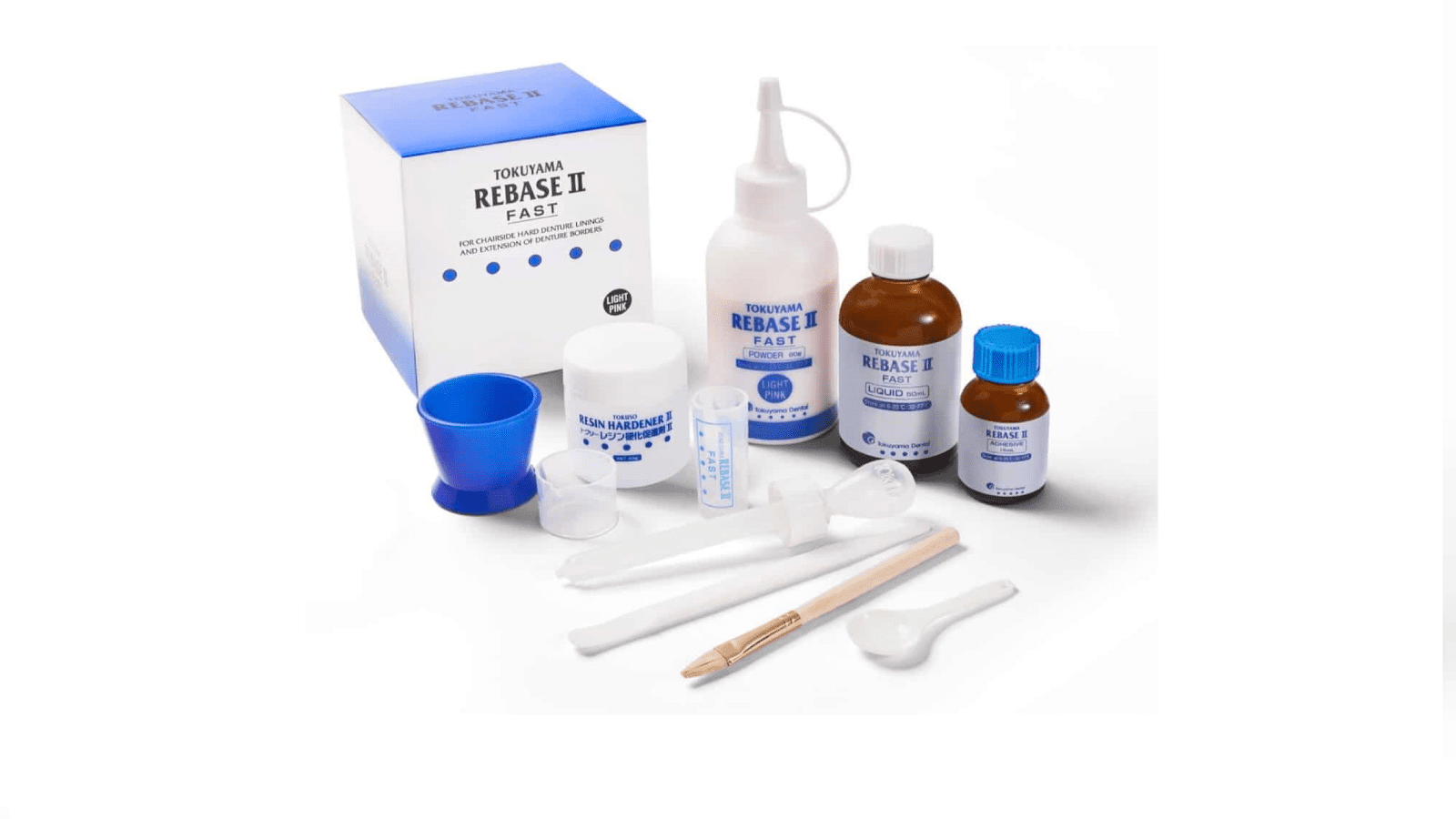
Product Description
Tokuyama Rebase II Fast is a heat-curing reline material designed for quick, comfortable, and accurate denture relining. With reduced heat generation and minimal odor, it enhances patient comfort while offering superior polishability and clinical efficiency.
Product Overview
This advanced formula allows intraoral insertion within 1–2 minutes after mixing, significantly faster than standard formulations. Its rapid working time shortens chair time, reduces material waste, and ensures precise adaptation to the denture base, making it a top choice for fast, high-quality relines.
Key Features
- Heat-curing reline material with fast set time
- Intraoral insertion possible within 1–2 minutes
- Lower heat generation enhances patient comfort
- Minimal odor during application
- Excellent polishability for smooth final results
- Saves time, material, and reduces chairside adjustments
- Delivers accurate adaptation and reliable fit
Common Applications
- Chairside denture relining
- Fast relining procedures in prosthodontics
- Use in time-sensitive clinical environments
Technical Specifications
Product Name: Tokuyama Rebase II Fast
Product Type: Fast-Setting Denture Reline Material
Curing Type: Heat-Curing
Insertion Time: 1–2 minutes after mixing
Polishability: High
Odor: Minimal
Manufacturer: Tokuyama Dental Corporation
Pricing
- Net32 Price: $107.99
Customer Ratings
Based on 10 reviews
Net32 Rating: 5.0 out of 5
Customer Feedback
Fast, efficient, and comfortable—perfect for quick relines
Excellent handling and polish with minimal odor

3. Nature-Cryl Pour Base & RepairResin by GC America
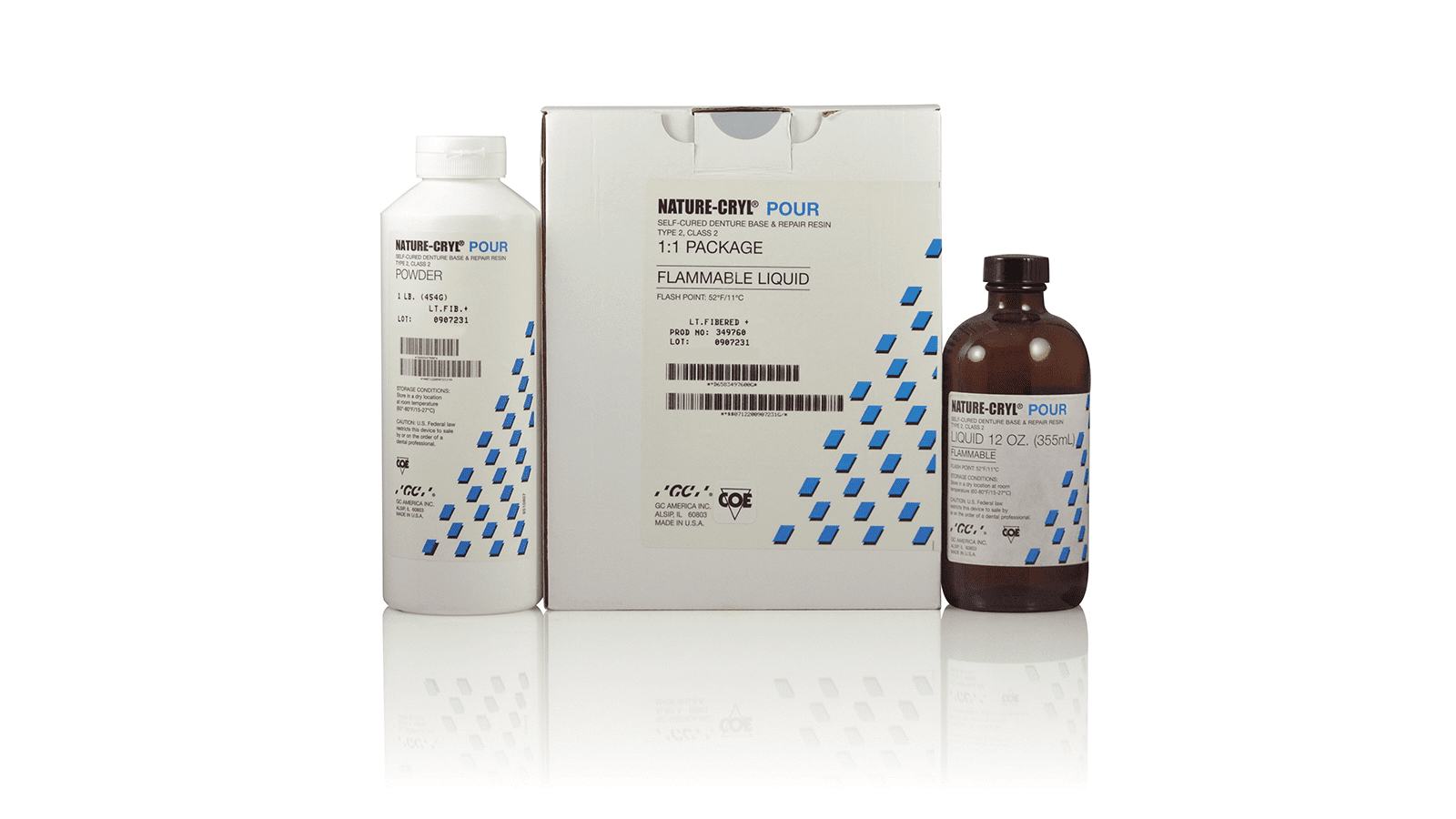
Product Description
Nature-Cryl® Pour Base & Repair Resin by GC America is a versatile, pour-and-cure acrylic resin designed for a wide range of dental applications, including denture base processing, relining, and repairs. Its fluid consistency and adaptability make it ideal for use with various resin techniques.
Product Overview
This pour-type resin is flask-invested with hydrocolloid or alginate and is compatible with Acri-Dense curing units. It is suitable for immediate dentures, orthodontic appliances, and retainers. Available in multiple shades—from clear to light reddish pink—it provides esthetic flexibility for patient-specific customization.
Key Features
- Multi-purpose acrylic resin for pouring and curing
- Suitable for denture bases, relines, and repairs
- Flask-invested with hydrocolloid or alginate
- Compatible with Acri-Dense curing units
- Available in various esthetic shades
- Ideal for orthodontic appliances and immediate dentures
Common Applications
- Denture base fabrication
- Relining and repair of dentures
- Orthodontic appliance and retainer fabrication
- Immediate denture procedures
Technical Specifications
Product Name: Nature-Cryl® Pour Base & Repair Resin
Product Type: Pour-and-Cure Acrylic Resin
Curing Method: Acri-Dense Units
Formulation: Flask-invested with hydrocolloid or alginate
Shades Available: Clear, Light Reddish Pink, and others
Manufacturer: GC America
Pricing
- Benco Dental Price: $62.79
Customer Ratings
Rating: 4.8 out of 5 (Based on verified reviews)
Customer Feedback
Highly adaptable for various applications
Smooth pour, dependable cure, and great esthetic options
4. Unifast Trad Acrylic Resin by GC America
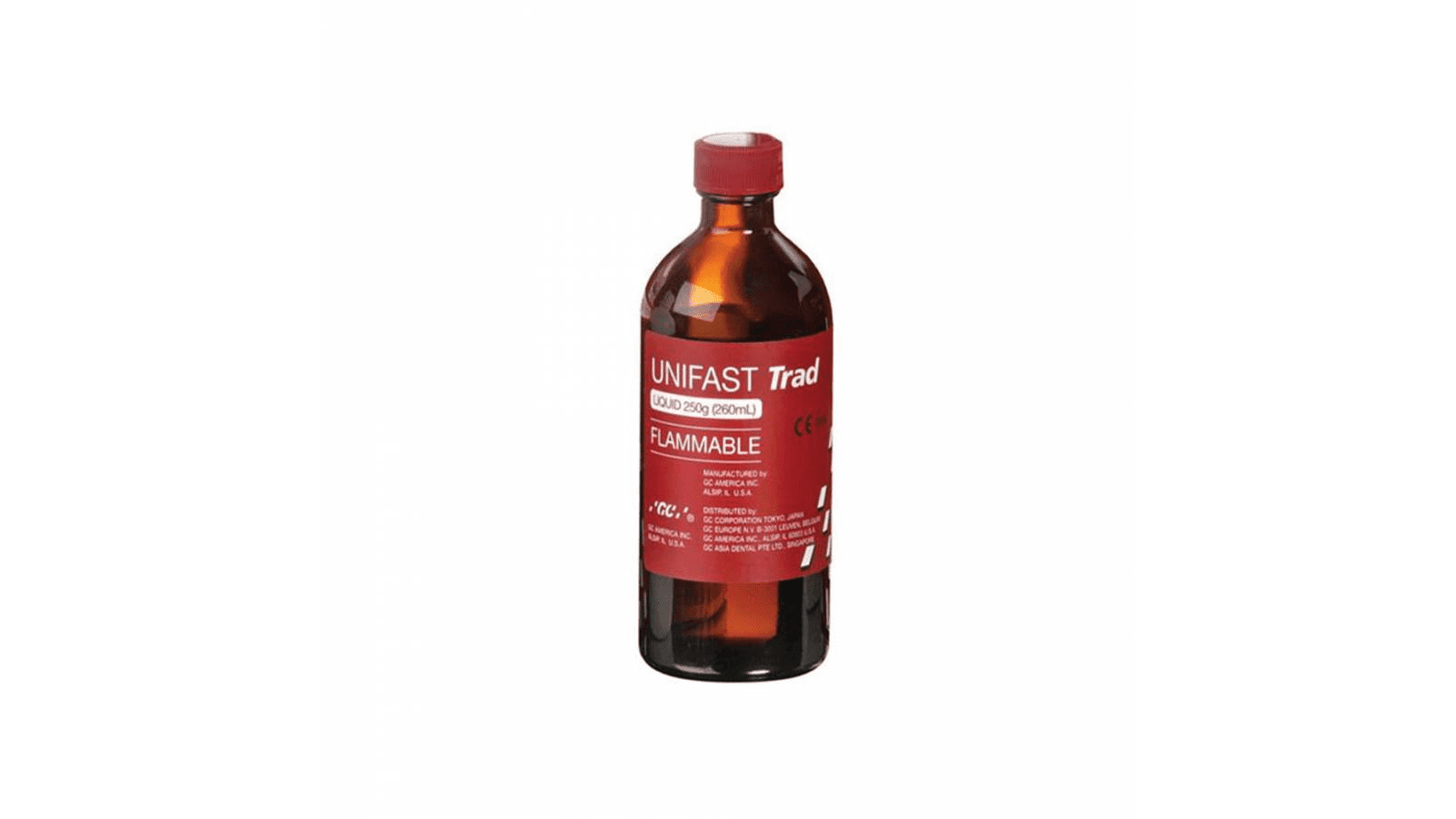
Product Description
Unifast Trad™ Acrylic Resin by GC America is a self-curing, general-purpose resin formulated for quick, efficient provisional restorations. Designed for ease of use and reliable handling, it offers a homogenous, bubble-free mix and is ideal for short-term dental applications.
Product Overview
Based on methyl methacrylate, Unifast Trad™ delivers excellent elasticity and memory, making it easy to remove from the impression or patient’s mouth without deformation. Its fast-setting nature allows for reduced chair time and improved workflow efficiency.
Key Features
- Self-curing acrylic resin for short-term restorations
- Methyl methacrylate-based formulation
- Creates a smooth, bubble-free mix
- High elasticity and memory effect reduce distortion
- Fast setting for quicker procedures
- Ideal for inlays, onlays, temporary crowns, and bridges
Common Applications
- Temporary inlays and onlays
- Short-term bridges and crowns
- Provisional restorations in removable prosthodontics
Technical Specifications
Product Name: Unifast Trad™ Acrylic Resin
Product Type: Self-Curing Acrylic Resin
Base Material: Methyl Methacrylate
Form: Available as Powder and Liquid
Manufacturer: GC America
Pricing
- Net32 Powder Price: $46.25
- Net32 Liquid Price: $27.90
Customer Ratings
Based on 2 reviews
Net32 Rating: 5.0 out of 5
Customer Feedback
Easy to mix and sets quickly without bubbles
Great for temporaries — smooth handling and excellent memory

5. Jet Tooth Self Cure Acrylic Resin by Lang Dental
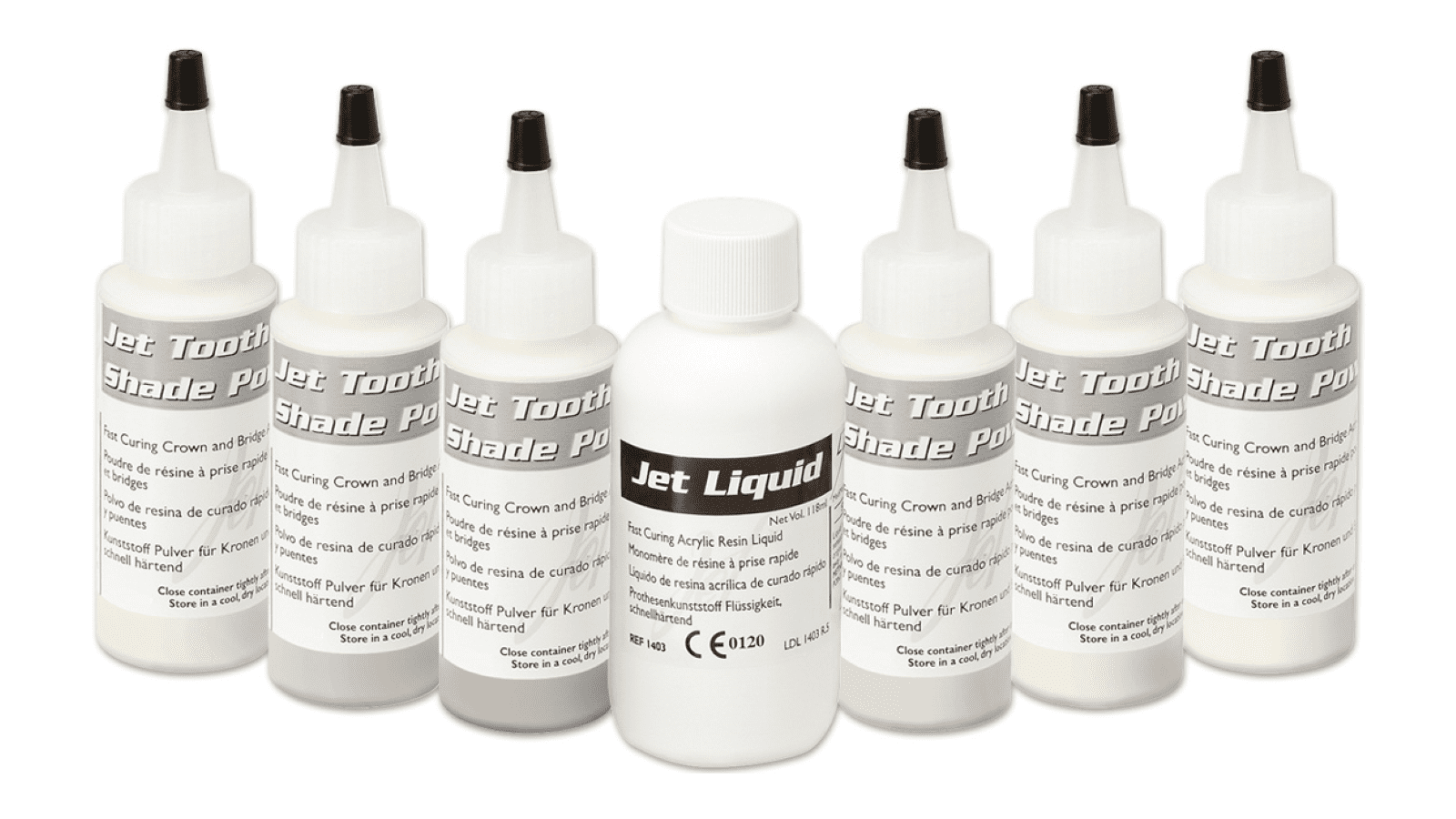
Product Description
Jet Tooth Self-Cure Acrylic Resin by Lang Dental is a high-quality, self-curing resin designed for temporary crown and bridge restorations. Utilizing a methyl methacrylate base, it delivers reliable durability, excellent surface detail, and a wide range of esthetic shade options.
Product Overview
With a working set time of 6 to 9 minutes, Jet Tooth resin is easy to handle and offers one of the most extensive shade selections on the market—from B1 to OM2. Its hard-setting formula makes it suitable for long-lasting provisional restorations with superior esthetics and strength.
Key Features
- Self-curing methyl methacrylate resin
- Fast set time: 6 to 9 minutes
- Extensive shade range (B1 to OM2) for optimal esthetics
- Durable enough for temporary crowns and bridges
- Excellent surface detail and polishability
- Ideal for long-term provisional results
Common Applications
- Temporary crown and bridge restorations
- Esthetic long-term provisional restorations
- Repair or fabrication of temporary dental appliances
Technical Specifications
Product Name: Jet Tooth Self-Cure Acrylic Resin
Product Type: Self-Curing Acrylic Resin
Base Material: Methyl Methacrylate
Set Time: 6–9 minutes
Shade Range: B1 to OM2
Manufacturer: Lang Dental
Pricing
- Net32 Price: $109.00
Customer Ratings
Based on 8 reviews
Net32 Rating: 5.0 out of 5
Customer Feedback
Excellent polish and durability — perfect for temporaries
One of the best shade ranges available for esthetic matching
